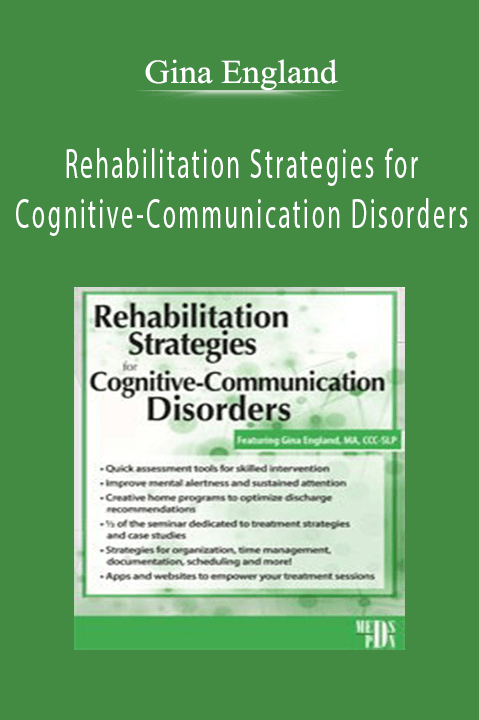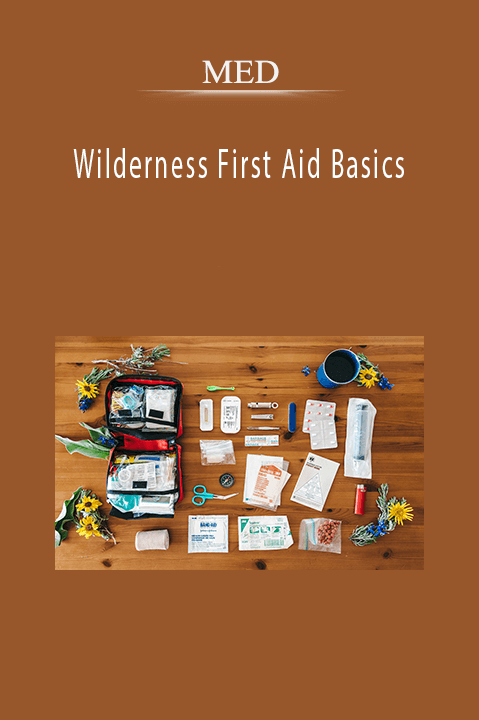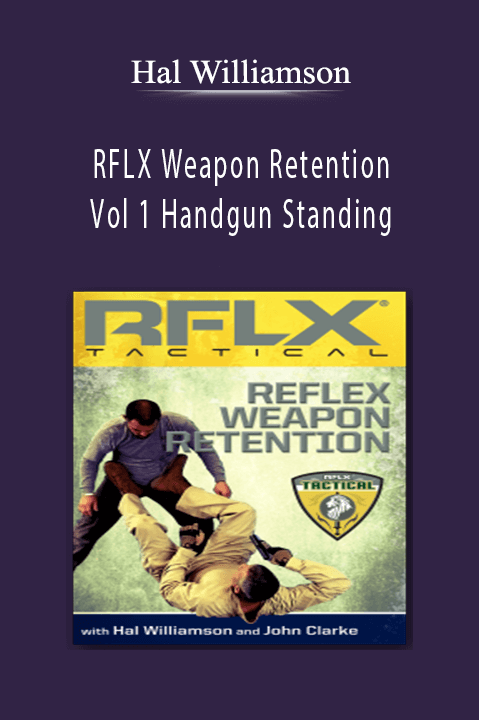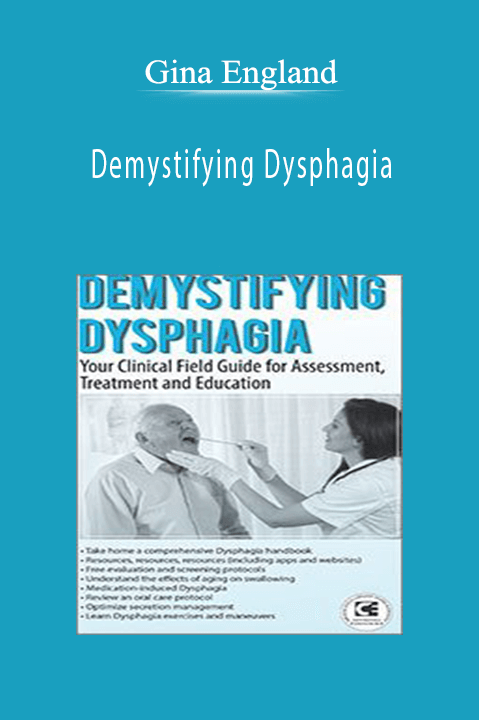Rehabilitation Strategies for Cognitive-Communication Disorders – Gina England
- Quick assessment tools for skilled intervention
- Improve mental alertness and sustained attention
- Creative home programs to optimize discharge recommendations
- ½ of the seminar dedicated to treatment strategies and case studies
- Strategies for organization, time management, documentation, scheduling and more!
- Apps and websites to empower your treatment sessions
Join Cognitive-Communication Rehabilitation expert Gina England for a recording filled with proven assessment protocols and creative treatment strategies for even your most complex clients. Drawing from more than 30 years of clinical experience, Gina shares quick assessment tools for skilled intervention and innovative, practical techniques for rehabilitating clients throughout the continuum of care. Spend more than half of the seminar focusing on treatment-specific strategies that you can implement in your practice immediately. Take home a comprehensive resource manual design for clinical use. This manual includes worksheets, handouts and information that can easily be used during assessments, treatment and client/family education.
Through lecture, case studies and a comprehensive resource manual full of creative and functional treatment approaches, you will learn how to optimize levels of alertness and sustained attention utilizing both pharmaceutical and clinical interventions. You will also learn strategies to increase your effectiveness as a clinician in the areas of organization, time management, documentation, scheduling and more! You will leave the seminar with a fresh and energized approach to your clinical practice.
- Identify 8 examples of executive cognitive functions.
- Recognize the expanding role of non-verbal communication in the 21st century.
- Differentiate examples of reversible versus non-reversible dementia syndromes.
- Specify 4 examples of informal cognitive-communication assessment procedures.
- Identify 2 resources that will assist you in locating functional outcome measures for cognition and language
- State 4 specific non-pharmaceutical approaches to maximizing sustained levels of alertness in a neurologically-impaired patient.
- Identify at least 6 new multimedia therapy activities applicable to cognitive-communication rehabilitation.
- Summarize currently available community-based resources for more efficient discharge planning.
Cognition: Executive Functions
- Attention
- Memory
- Planning and Organization
- Insight
- Cognitive Flexibility
- Problem Solving – Verbal and Non-Verbal
- Sequencing
- Judgment
- Safety Awareness
- Time Management
Communication: Form-Content-Use
- Phonology-Morphology-Syntax
- Fluency and Voice
- Semantics and Language
- Reading-Writing-Keyboarding-Texting-Tweeting
- Non-Verbal Communication
- Social Pragmatics
Dementia
- Reversible versus Irreversible Conditions
- Assessment Tools
- The Stages of Dementia and Skilled Interventions
- Orientation versus Self-Re-Orientation
- Facilitated Reminiscence
- Personalized Memory Book/DVD/CD
Assessment of Cognitive-Communication Disorders
- Clinical Value of Informal Assessment Procedures
- Functional Outcome Measures
- Available Protocols for Your Immediate Use
- Executive Functions
- Auditory Comprehension
- Visual Comprehension
- Verbal Expression
- Motor Speech
- Abstract / Complex Language Functions
- Written Expression
- Social Pragmatic Skills
Cognitive-Communication Rehabilitation
- Reduced Mental Alertness
- Co-Morbidities
- Psycho-Emotional Factors
- Shallow Insight
- Pain
- Medication Interactions
- The Cookie Cutter Approach to Therapy- Clinician Burnout
- Clinical and Non-Clinical Time Constraints
- Reduced Length of Stays
Creative Discharge Planning: 24-Hour Supervision and Post-Therapy Recovery
- Professional Services
- Community Resources
- Cognitive-Linguistic Home Programs
- Manage 24-Hour Supervision in the Home
- Return to Driving
Treatment Strategies: Functional and Creative
- Ways to Revitalize Your Practice
- Reduce Documentation Demands
- Time-Saving Strategies for Management of High Census Caseloads
- Make Your Case for a New Modality, Equipment, Certification or Materials – How to Get the Funding
Clinical Interventions
- Maximize Level of Arousal and Alertness During
- Therapy – Pharmaceutical and Non-Pharmaceutical Techniques
- Optimize the Impact of Nutrition, Hydration and Multi-Sensory Stimulation
- Facilitate Neural Activity and Re-Connections During “Down Time”
- Medication Interactions in the Aging Population Deal with Pain
Treatment Alternatives to the Artificial Clinical Setting
- The Cognitive-Linguistic Toy Store:
- Websites
- Online Cognitive Games
- Workbooks
- iPad® Apps
- Software Programs
- Computer Brain Training Programs
- Inexpensive Card and Board Games
Get Download Rehabilitation Strategies for Cognitive-Communication Disorders – Gina England at Offimc.click Now!
Delivery Information
- Upon ordering the product, a delivery email with download instructions will be sent immediately to you so that you may download your files. If you log in (or create an account) prior to purchase you will also be able to access your downloads from your account dashboard.
- It is a digital download, so please download the order items and save them to your hard drive. In case the link is broken for any reason, please contact us and we will resend the new download link to you.
- If you don't receive the download link, please don’t worry about that. We will update and notify you as soon as possible from 8:00 AM – 8:00 PM (UTC+8).
- Please Contact Us if there are any further questions or concerns you may have. We are always happy to assist!









12 reviews for Gina England – Rehabilitation Strategies for Cognitive–Communication Disorders
There are no reviews yet.